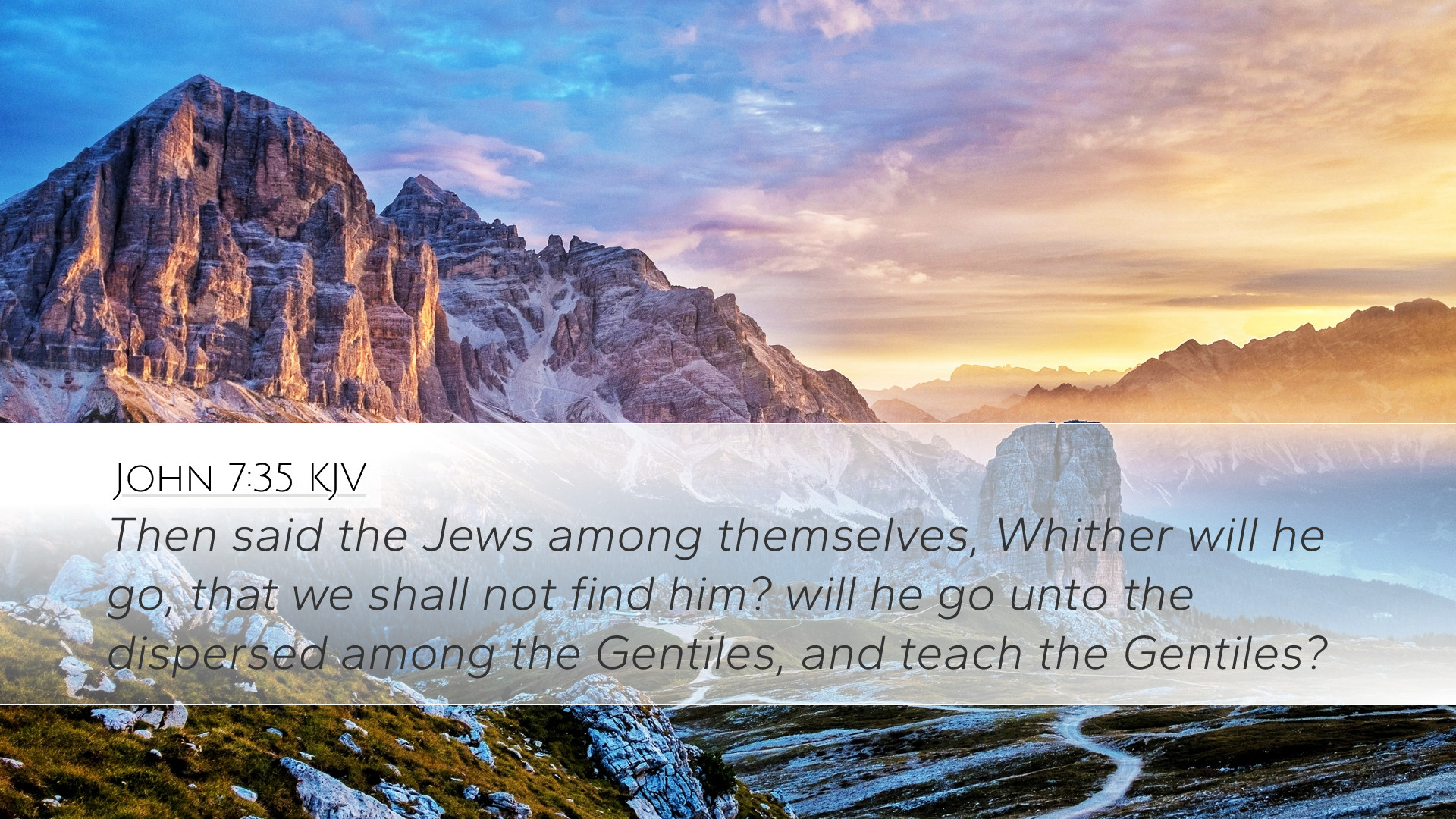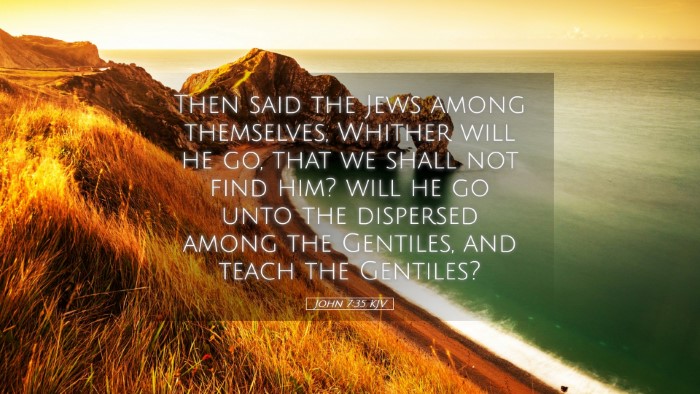Commentary on John 7:35
Verse Reference: John 7:35 ("Then said the Jews among themselves, Whither will he go, that we shall not find him? will he go unto the dispersed among the Gentiles, and teach the Gentiles?")
Contextual Background
In this passage, we find Jesus in the midst of the Feast of Tabernacles, a time of great celebration and reflection for the Jewish people. His teachings have led to increased tension between Him and the Jewish religious leaders. The verse captures a moment where confusion reigns among the Jews regarding Jesus' intentions and His ultimate fate.
Insights from Commentators
Matthew Henry's Commentary
Matthew Henry observes that the Jews were perplexed by Jesus' words, especially His implications about His departure and the challenges He presented to their understanding. He notes that the question "Whither will he go?" reflects their lack of understanding, indicating that they couldn't grasp the spiritual nature of His mission. Henry emphasizes the irony of their inquiry, as they were oblivious to the true meaning of His words. He suggests that this reflects the spiritual blindness of the leaders, which serves as a warning to those who remain obstinate in their unbelief.
Albert Barnes' Notes on the New Testament
Barnes highlights the significance of the term "dispersed among the Gentiles," which alludes to the Jewish diaspora. He interprets the Jews’ question as expressing a fear that Jesus might seek to reach out beyond the boundaries of Judaism, thereby fulfilling the prophecies concerning the Gentiles coming to the light. Barnes elaborates that this inquiry reveals the exclusionist mindset of the Jewish leaders, who cannot fathom that the Messiah's mission includes all peoples, not just the Jews. He encourages readers to recognize the inclusive nature of Christ's ministry.
Adam Clarke's Commentary on the Bible
Clarke adds depth by suggesting that the Jewish leaders, in their ignorance, suspected that Jesus might abandon them to go teach the Gentiles. He points out that this was a reflection of their national pride and their disdain for non-Jews. Clarke's analysis indicates that this passage speaks to the broader theme of Jesus’ mission transcending ethnic and religious boundaries. He remarks upon the prophetic implications, suggesting that such thoughts inadvertently pointed to the fulfillment of Jesus’ mission to save all humanity.
Theological Implications
- The Nature of Revelation: The confusion among the Jews illustrates the challenge of divine revelation. Jesus’ statements often cryptic and spiritually discerned, provoke responses that reveal human limitations in understanding divine initiatives.
- The Universality of the Gospel: The notion of teaching the Gentiles lays foundational stones for the Christian Church’s mission to the world. This reflects the central tenet of Christianity that the Gospel is available to all, breaking down barriers of ethnicity and culture.
- Spiritual Blindness: The inquiry of the Jewish leaders underscores spiritual blindness that can occur when one adheres too closely to tradition and is unwilling to see God working in new ways. This serves as a cautionary note for contemporary believers.
Practical Applications for Today
For pastors, students, theologians, and Bible scholars, John 7:35 serves as a rich text for reflection on several levels:
- Evangelism and Outreach: Embracing the inclusive mission of Christ encourages the Church to reach out to ethnically and culturally diverse communities, emphasizing unity in diversity.
- Understanding Scripture: The passage urges its audience to explore deeper meanings behind Jesus’ words and to seek understanding beyond just a surface reading of the text.
- Awareness of Blindness: It acts as a prompt for self-examination regarding areas of spiritual blindness or complacency in our understanding of God’s work, challenging believers to remain open to His leading.
Conclusion
John 7:35 encapsulates the tension between Jesus and the Jewish leaders, showcasing not only their confusion but also Jesus' broader mission to seek and save the lost, regardless of their ethnic background. Reflecting on the insights from public domain commentaries enriches our understanding and encourages thoughtful application of Scripture in our modern context.


